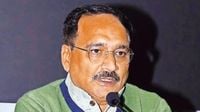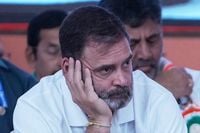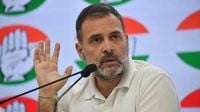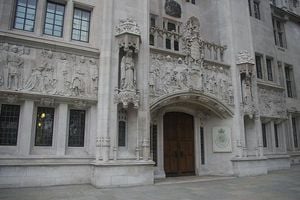On Friday, April 18, 2025, the BJP Yuva Morcha staged a protest outside the Congress headquarters in New Delhi, demanding the resignation of Rahul Gandhi due to his alleged involvement in the National Herald case. Protesters also called for Gandhi's removal from the Congress party altogether, reflecting growing tensions surrounding the ongoing investigation.
The Enforcement Directorate (ED) has filed a chargesheet against seven individuals, including prominent Congress leaders Sonia Gandhi and Rahul Gandhi, in connection with its money laundering probe related to the National Herald case. This case, which dates back to 2012 during the Congress-led government, has resurfaced as a contentious issue in Indian politics.
Delhi BJP President Virendra Sachdeva addressed the crowd, stating, "This case dates back to 2012, during the Congress government. Now, when the investigative agencies are doing their job, why does it bother them?" He further alleged that during the National Herald matter, former Prime Minister Manmohan Singh was in office, but it was Sonia Gandhi who acted as the "super PM," with Rahul Gandhi managing the situation.
Sachdeva claimed that public tax money, collected as donations, was embezzled through Associated Journals Ltd (AJL) and a company called Young India. He emphasized, "Today, the country is demanding answers from Rahul Gandhi, and that’s what troubles him. Until we get those answers, our protest will continue." This statement underscores the BJP's strategy to leverage the controversy as a means to challenge the Congress party's credibility.
In response to the protest and the ongoing investigation, the Congress party characterized the actions against them as "politics of vendetta and intimidation." This assertion reflects their stance that the BJP is using the legal system as a political weapon against its rivals.
Meanwhile, Rahul Gandhi is also facing challenges within his party as he attempts to revamp the Congress in Gujarat, a state long dominated by the BJP. The high-stakes initiative aims to rejuvenate a fading Congress presence by restructuring district and city-level committees. The All India Congress Committee (AICC) has deployed an unprecedented 183 observers, each accompanied by four state-level leaders, to assess the political landscape and consult party workers.
However, early signs of internal dissent have surfaced as some observers have raised objections to their assigned districts. While logistical issues such as long travel distances are cited, insiders suggest that deeper political motives are at play. Some leaders are reportedly lobbying for assignments closer to their hometowns to consolidate influence in areas where they have established support networks.
This situation highlights a persistent issue within the Gujarat Congress—leadership's detachment from ground realities and a tendency to prioritize personal clout over collective organizational renewal. When confronted with reports of discontent, Gujarat Congress in-charge Mukul Wasnik denied any internal strife, asserting, "All observers are fully committed to the task. The exercise will be completed by May-end, and the final reports will guide the leadership in forming robust city and district units."
Yet, the growing undercurrents of dissent suggest that unless the party addresses these internal issues transparently, the revamp may become yet another missed opportunity in a state where Congress's organizational machinery is already in tatters. The Rahul Gandhi-led initiative, while bold in intent, risks being undermined by old habits of factionalism and political self-preservation that have long plagued the party in Gujarat.
As the Congress party grapples with these challenges, the BJP continues to capitalize on the situation, framing the National Herald case as a critical issue of accountability. The political landscape in India remains highly charged, with both parties vying for public support amidst ongoing investigations and internal strife.
In conclusion, the protests led by the BJP Yuva Morcha and the internal struggles within the Congress party reflect a broader narrative of political rivalry in India. As the situation unfolds, the implications for both parties could shape the future of Indian politics significantly.






